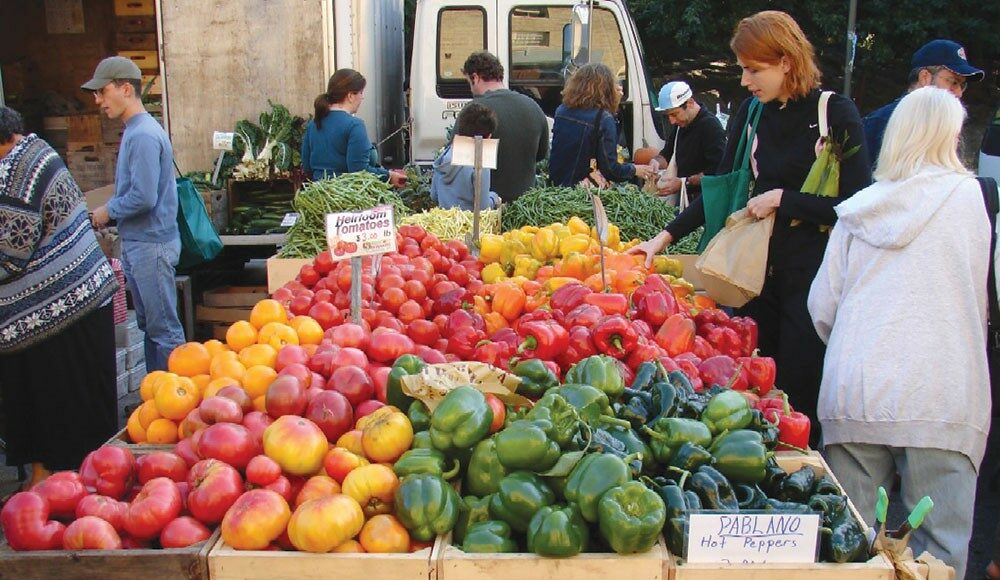Imagine that nearly everything you ate for a straight month had to be grown within a 10-mile radius of your home. What would you eat? How much would you have to give up? What might you discover about the strength and weaknesses of your regional food system that you might never have realized before?
In September 2010, Vicki Robin, bestselling co-author of Your Money or Your Life, took on this very challenge in her hometown of Langley, Wash., a semi-rural hamlet on the south end of Whidbey Island, 30 miles north of Seattle.
“Doing this experiment was a huge eye-opener for me in terms of justice, politics, regulations, cooking and community,” Robin says on the phone from her home.
A serial yo-yo dieter and dedicated practitioner of “bedtime mini-gorges,” Robin writes with down-to-earth honesty and humor about her personal transformation through food awareness. Despite a long history of anti-consumerist activism, Robin says, she’d never been able to align her values with her own personal behavior. That is, not until a local farmer friend asked Robin to be a guinea pig in a simple-sounding but logistically challenging proposition: to test whether she could actually feed another human being for a full month entirely from produce grown on a half-acre farm. At the time, the only thing Robin could buy at her local grocery store that fit into the 10-mile limit was a bottle of local honey.
It wasn’t the first time Robin had dived into “sustainability as an extreme sport,” but nonetheless she began blogging about her 10-mile diet immediately. By the end of the month, she’d written 25,000 words—the ideas that came together to make up her new book Blessing the Hands That Feed Us: What Eating Closer to Home Can Teach Us About Food, Community and Our Place on Earth. Robin appears at Copperfield’s in Santa Rosa on Jan. 17 and Copperfield’s San Rafael on Jan. 18.
Early on, Robin and her friend Trina, the farmer, realized that the abundant vegetables from the farm wouldn’t provide enough nutrients for a woman in her late 60s to survive on healthily. So they allowed for a few exceptions, the exotics that would keep Robin going. These included olive oil, lemons and limes, a few Indian spices, salt and caffeine (in the form of tea).
The search began for meats and dairy sourced within a 10-mile radius, most of which Robin found without much trouble, and with the added bonus of developing new friendships. One friend makes her a fresh weekly tub of goat chèvre. Another neighbor with a dairy cow provides her with contraband raw milk. The eternally frugal Robin even buys a $25 local, organic whole chicken, leading to a fascinating breakdown of just why and how a chicken should cost so much, even if Foster Farms has factory-farmed chicken selling for $10 a pop at the local industrial food mart.
“Food in our culture is unnaturally cheap,” explains Robin. “We pay the smallest percentage for food than almost any country in the world. In giving our power over to the industrial food system, we’ve lost a sense of food as a precious part of existence, she adds.
“If you are a revolutionary, you need to cook and you need to teach other people to cook,” says Robin, readily acknowledging how she chafed against domesticity for years and at the prospect of “spending my life in a blowsy kimono cooking eggs” for a husband and two children. In fact, when the publisher asked for recipes to be included in Blessing the Hands, she initially balked. “This isn’t about recipes,” Robin told the publisher. “This is about systems thinking and spiritual transformation.”
These days, she’s seen the light.
“Cooking takes back your power,” Robin says. “If you can grow and cook your own food, you are freer.” A prime place to begin, she says, is learning to cook with whole ingredients, following something she calls “OWL”: organic, whole and local. It’s a luxury not just for hippies and yuppies. “Learning to cook with whole foods can nourish your family, and on a budget,” she adds.
In the book, Robin breaks down the cost of making a grass-fed burger at home with a side of fries made from organic, local potatoes, in comparison to driving to the local fast food joint for the same meal. The almost negligible difference in price is surprising.
An abiding passion for food-shed transformation, food democracy and restoring the vitality and prosperity of regional food chains has become a driving force in Robin’s life—that and how eating and preparing food can bring people together, a process she called “relational eating.”
All of this, in addition to becoming part of the Whidbey Island food web, has helped Robin to conquer a long time “bag lady fear,” she says.
“This sense of belonging is not only nice for my heart and soul, but also, I don’t think I’m going to starve,” she says. “As I get older, people will take care of me. And I entered that social safety net through food.”
Vicki Robin appears at Friday, Jan. 17, at Copperfield’s Santa Rosa (775 Village Court, Montgomery Village, Santa Rosa; 7pm; free) and Saturday,
Jan. 18, at Copperfield’s San Rafael (850 Fourth St., San Rafael; 1pm; free).











